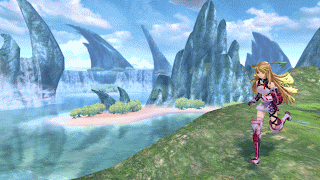 The Tales series has a long history; 14 main games and a handful of side quests. Through that time there has been a remarkably consistent approach to game design and though there’s been general improvements and tweaks to the spreadsheets operating the game, for the player, there’s a familiarity about the Tales games that is greater than what you’ll find in most other JRPGs.
The Tales series has a long history; 14 main games and a handful of side quests. Through that time there has been a remarkably consistent approach to game design and though there’s been general improvements and tweaks to the spreadsheets operating the game, for the player, there’s a familiarity about the Tales games that is greater than what you’ll find in most other JRPGs.
That’s what the fans of this series seem to want, but that aside, Xillia proves one thing quite conclusively – the Tales series needs a rethink. It’s just not advancing as quickly as its immediate rivals.
 And that’s possibly why this series has never really struck a chord with me. I like my RPGs to have strategic battling, and those games that don’t really allow for that, such as the Tales games, fail to engage with me. I feel pretty passive as I play through these games, and Xillia’s not a whole lot different in this regard – in fact as an experiment I blocked my way through an entire boss battle. It’s great that the AI is effective, but when it’s at the expense of player agency, it’s crippling for any sense of attachment that we’re meant to have for this game or its character and world.
And that’s possibly why this series has never really struck a chord with me. I like my RPGs to have strategic battling, and those games that don’t really allow for that, such as the Tales games, fail to engage with me. I feel pretty passive as I play through these games, and Xillia’s not a whole lot different in this regard – in fact as an experiment I blocked my way through an entire boss battle. It’s great that the AI is effective, but when it’s at the expense of player agency, it’s crippling for any sense of attachment that we’re meant to have for this game or its character and world. I was excited to see that Xillia also had a titles system, but then disappointed to discover that its impact on the game is far closer to a simple achievements system. What replaces the titles system is to me a step backwards and it seems the developers have decided to do away with their fleeting attempt to introduce depth into the combat system in order to instead ramp up the action. But at least Xillia does have a far faster and more fluid action system than the previous Tales games. I know that’s going to find a lot of fans amongst the fans of the series.
I was excited to see that Xillia also had a titles system, but then disappointed to discover that its impact on the game is far closer to a simple achievements system. What replaces the titles system is to me a step backwards and it seems the developers have decided to do away with their fleeting attempt to introduce depth into the combat system in order to instead ramp up the action. But at least Xillia does have a far faster and more fluid action system than the previous Tales games. I know that’s going to find a lot of fans amongst the fans of the series.And so they jump from town to town, indulging in a couple of side quests to help citizens with their individual concerns while tracking towards the next major conflict on their road to the final boss. A couple of hours in the game introduces a sinister mystery and this, naturally, is intended to keep driving players forward to figure out what is really going on.
 It’s also worth noting that without giving away spoilers the ending for Xillia is very disappointing indeed. The Tales series doesn’t often do sequels, and now I know why; the writers clearly struggled to finish this one in a satisfactory way while setting up for Tales of Xillia 2.
It’s also worth noting that without giving away spoilers the ending for Xillia is very disappointing indeed. The Tales series doesn’t often do sequels, and now I know why; the writers clearly struggled to finish this one in a satisfactory way while setting up for Tales of Xillia 2. 







